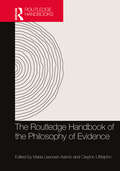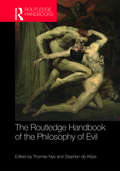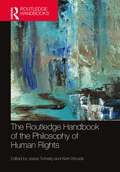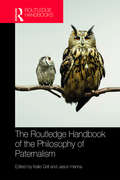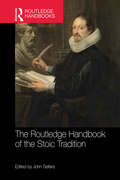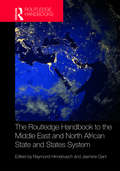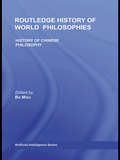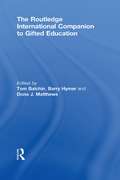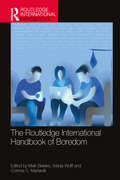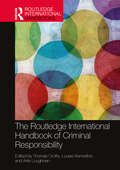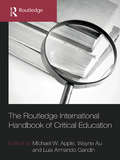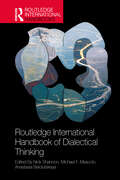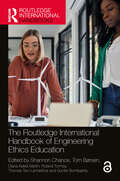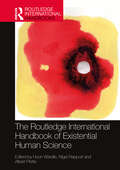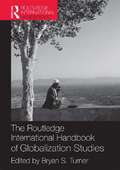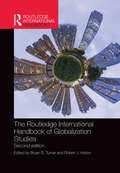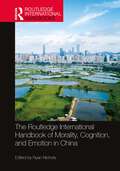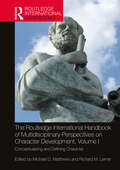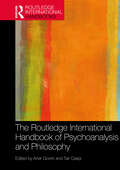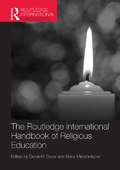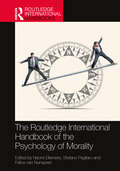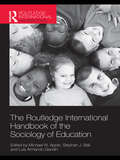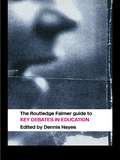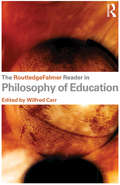- Table View
- List View
The Routledge Handbook of the Philosophy of Evidence (Routledge Handbooks in Philosophy)
by Clayton Littlejohn Maria Lasonen-AarnioWhat one can know depends on one’s evidence. Good scientific theories are supported by evidence. Our experiences provide us with evidence. Any sort of inquiry involves the seeking of evidence. It is irrational to believe contrary to your evidence. For these reasons and more, evidence is one of the most fundamental notions in the field of epistemology and is emerging as a crucial topic across academic disciplines.The Routledge Handbook of the Philosophy of Evidence is an outstanding reference source to the key topics, problems, and debates in this exciting subject and is the first major volume of its kind. Comprising forty chapters by an international team of contributors the handbook is divided into six clear parts: The Nature of Evidence Evidence and Probability The Social Epistemology of Evidence Sources of Evidence Evidence and Justification Evidence in the Disciplines The Routledge Handbook of the Philosophy of Evidence is essential reading for students and researchers in philosophy of science and epistemology, and will also be of interest to those in related disciplines across the humanities and social sciences, such as law, religion, and history.
The Routledge Handbook of the Philosophy of Evil (Routledge Handbooks in Philosophy)
by Thomas Nys Stephen De WijzeWhy ought we concern ourselves with understanding a concept of evil? It is an elusive and politically charged concept which critics argue has no explanatory power and is a relic of a superstitious and primitive religious past. Yet its widespread use persists today: we find it invoked by politicians, judges, journalists, and many others to express the view that certain actions, persons, institutions, or ideologies are not just morally problematic but require a special signifier to mark them out from the ordinary and commonplace. Therefore, the question of what a concept of evil could mean and how it fits into our moral vocabulary remains an important and pressing concern. The Routledge Handbook of the Philosophy of Evil provides an outstanding overview and exploration of these issues and more, bringing together an international team of scholars working on the concept of evil. Its 27 chapters cover the crucial discussions and arguments, both historical and contemporary, that are needed to properly understand the historical development and complexity of the concept of evil. The Handbook is divided into three parts: Historical explorations of evil Recent secular explorations of evil Evil and other issues. The Routledge Handbook of the Philosophy of Evil is essential reading for students and researchers in the fields of ethics and philosophy of psychology. It also provides important insights and background for anyone exploring the concept of evil in related subjects such as literature, politics, and religion.
The Routledge Handbook of the Philosophy of Human Rights (Routledge Handbooks in Philosophy)
by Kerri Woods Jesse TomaltyThe Routledge Handbook of the Philosophy of Human Rights is an outstanding resource covering key questions, problems, and debates in scholarship on the nature, justification, authority and relevance of human rights.The volume comprises 35 chapters by leading scholars from a range of philosophical orientations and traditions. The Handbook is divided into five sections: Approaching the Philosophy of Human Rights Grounds of Human Rights Critical Perspectives Contemporary Human Rights Issues Human Rights of Groups The volume is essential reading for students and researchers in philosophy who are interested in understanding human rights. It is also a valuable resource for those in related fields including law, political science, sociology, and the humanities.
The Routledge Handbook of the Philosophy of Paternalism (Routledge Handbooks in Applied Ethics)
by Kalle Grill Jason HannaWhile paternalism has been a long-standing philosophical issue, it has recently received renewed attention among scholars and the general public. The Routledge Handbook of the Philosophy of Paternalism is an outstanding reference source to the key topics, problems and debates in this exciting subject and is the first collection of its kind. Comprising twenty-seven chapters by a team of international contributors the handbook is divided into five parts: • What is Paternalism? • Paternalism and Ethical Theory • Paternalism and Political Philosophy • Paternalism without Coercion • Paternalism in Practice Within these sections central debates, issues and questions are examined, including: how should paternalism be defined or characterized? How is paternalism related to such moral notions as rights, well-being, and autonomy? When is paternalism morally objectionable? What are the legitimate limits of government benevolence? To what extent should medical practice be paternalistic? The Routledge Handbook of the Philosophy of Paternalism is essential reading for students and researchers in applied ethics and political philosophy. The handbook will also be very useful for those in related fields, such as law, medicine, sociology and political science.
The Routledge Handbook of the Stoic Tradition (Routledge Handbooks in Philosophy)
by John SellarsThe ancient philosophy of stoicism has been a crucial and formative influence on the development of Western thought since its inception through to the present day. It is not only an important area of study in philosophy and classics, but also in theology and literature. The Routledge Handbook of the Stoic Tradition is the first volume of its kind, and an outstanding guide and reference source to the nature and continuing significance of stoicism. Comprising twenty-six chapters by a team of international contributors and organised chronologically, the Handbook is divided into four parts: Antiquity and the Middle Ages, including stoicism in Rome; stoicism in early Christianity; the Platonic response to stoicism; and stoic influences in the late Middle Ages Renaissance and Reformation, addressing the impact of stoicism on the Italian Renaissance, Reformation thought, and early modern English literature including Shakespeare Early Modern Europe, including stoicism and early modern French thought; the stoic influence on Spinoza and Leibniz; stoicism and the French and Scottish Enlightenment; and Kant and stoic ethics The Modern World, including stoicism in nineteenth century German philosophy; stoicism in Victorian culture; stoicism in America; stoic themes in contemporary Anglo-American ethics; and the stoic influence on modern psychotherapy. An invaluable resource for anyone interested in the philosophical history and impact of stoic thought, The Routledge Handbook of the Stoic Tradition is essential reading for all students and researchers working on the subject.
The Routledge Handbook to the Middle East and North African State and States System
by Raymond Hinnebusch Jasmine GaniConflict and instability are built into the very fabric of the Middle East and North African (MENA) state and states system; yet both states and states system have displayed remarkable resilience. How can we explain this? This handbook explores the main debates, theoretical approaches and accumulated empirical research by prominent scholars in the field, providing an essential context for scholars pursuing research on the MENA state and states system. Contributions are grouped into four key themes: • Historical contexts, state-building and politics in MENA • State actors, societal context and popular activism • Trans-state politics: the political economy and identity contexts • The international politics of MENA The 26 chapters examine the evolution of the state and states system, before and after independence, and take the 2011 Arab uprisings as a pivotal moment that intensified trends already embedded in the system, exposing the deep features of state and system—specifically their built-in vulnerability and their ability to survive. This handbook provides comprehensive coverage of the history and role of the state in the MENA region. It offers a key resource for all researchers and students interested in international relations and the Middle East and North Africa.
The Routledge History of Chinese Philosophy: Constructive Engagement (Routledge History of World Philosophies #Vol. 27)
by Bo MouThe History of Chinese Philosophy is a comprehensive and authoritative examination of the movements and thinkers that have shaped Chinese philosophy over the last three thousand years. An outstanding team of international contributors provide seventeen accessible entries organised into five clear parts: Identity of Chinese Philosophy Classical Chinese Philosophy (I): Pre-Han Period Classical Chinese Philosophy (II): From Han Through Tang Classical Chinese Philosophy (III): From Song Through Early Qing Modern Chinese Philosophy: From Late Qing Through 21st Century This outstanding collection is essential reading for students of Chinese philosophy, and will be of interest to those seeking to explore the lasting significance this rich and complex philosophical tradition.
The Routledge International Companion to Gifted Education
by Barry Hymer Tom Balchin Dona J. MatthewsThe Routledge International Companion to Gifted Education is a ground-breaking collection of fully-referenced chapters written by many of the most highly-respected authorities on the subject from around the world. These fifty contributors include distinguished scholars who have produced many of the most significant advances to the field over the past few decades, like Joseph Renzulli and Robert Sternberg, alongside authorities who ask questions about the very concepts and terminology embodied in the field – scholars such as Carol Dweck and Guy Claxton. This multi-faceted volume: highlights strategies to support giftedness in children, providing ideas that work and weeding out those that don’t; is written in jargon-free language in an easy-to use themed format; is the most authoritative collection of future-focused views, ideas and reflections, practices and evaluations yet produced; includes chapters dealing with the major controversies and concerns in the field today, from the problems of identification to changing understandings of giftedness and creativity. The international aspect of the Companion, and its juxtaposition of points of view – whereby chapters are deliberately positioned and accompanied by editorial commentary to highlight the contrasts with each other – ensures that different views are addressed, allowing the reader to absorb and reflect upon the many perspectives on each issue. The Companion is a guide to the new ideas and controversies that are informing gifted education discussion and policy-making around the world. It is a first class resource to students and researchers alike.
The Routledge International Handbook of Boredom (Routledge International Handbooks)
by Maik Bieleke Wanja Wolff Corinna S. MartarelliThis comprehensive text is a unique handbook dedicated to research on boredom. The book brings together leading contributors from across three continents and numerous fields to provide an interdisciplinary exploration of boredom, its theoretical underpinnings, its experiential properties, and the applied contexts in which it occurs.Boredom is often viewed as a mental state with little utility, though recent research suggests that it can be a powerful motivator of human behavior that shapes our actions in many ways. The book examines boredom from a range of perspectives and is comprised of three parts. Part I delves into the theoretical approaches to boredom, presenting methods for its measurement, explaining when and why boredom occurs, and scrutinizing the impact it has on our behavior. Part II focuses on the psychological and neural properties of boredom and its associations with a multitude of mental and interpersonal processes, such as self-control, mind-wandering, flow, and aggression. Part III presents boredom in practical contexts like school and work, and sheds light on its role for health-related behaviors, psychosocial well-being, and aesthetic experiences. The book concludes by summarizing the state of boredom research, identifying promising areas for future research, and providing directions for how research on boredom can be advanced. As the authoritative book on boredom, this handbook is an essential resource for students and researchers of psychology, sociology, education, sport science, and computer science.
The Routledge International Handbook of Criminal Responsibility (Routledge International Handbooks)
by Thomas Crofts Arlie Loughnan Louise KennefickPresenting cutting-edge research and scholarship, this extensive volume covers everything from abstract theorising about the meanings of responsibility and how we blame, to analysing criminal law and justice responses, and factors that impact individual responsibility.Inviting exchanges across a burgeoning critical scholarship on criminal responsibility, this Handbook showcases the diverse range of methodologies applied to the field, including socio-political approaches, critical historical methods, criminological and sociological perspectives, and interdisciplinary studies bridging law and the mind sciences. Spanning global networks of established and emerging scholars of responsibility for crime, this book explores how we relate to one another as human beings under the spotlight of the criminal law. In doing so, it is hoped that the collection not only does justice to the vibrant landscape of criminal responsibility studies, but inspires new directions and future synergies in this compelling field.The Routledge International Handbook of Criminal Responsibility will appeal to scholars and students of criminal law, criminal justice, criminology, sociology, psychology, neuroscience, philosophy, and socio-legal studies, as well as practitioners and policymakers working in related fields.
The Routledge International Handbook of Critical Education (Routledge International Handbooks of Education)
by Michael W. Apple Wayne Au Luis Armando GandinThe Routledge International Handbook of Critical Education is the first authoritative reference work to provide an international analysis of the relationship between power, knowledge, education, and schooling. Rather than focusing solely on questions of how we teach efficiently and effectively, contributors to this volume push further to also think critically about education's relationship to economic, political, and cultural power. The various sections of this book integrate into their analyses the conceptual, political, pedagogic, and practical histories, tensions, and resources that have established critical education as one of the most vital and growing movements within the field of education, including topics such as: social movements and pedagogic work critical research methods for critical education the politics of practice and the recreation of theory the freirian legacy. With a comprehensive introduction by Michael W. Apple, Wayne Au, and Luis Armando Gandin, along with thirty-five newly-commissioned pieces by some of the most prestigious education scholars in the world, this Handbook provides the definitive statement on the state of critical education and on its possibilities for the future.
The Routledge International Handbook of Dialectical Thinking (Routledge International Handbooks)
by Michael F. Mascolo Nick Shannon Anastasia BelolutskayaThe Routledge International Handbook of Dialectical Thinking is a landmark volume offering a multi-disciplinary compendium of the research, theory and practice that defines dialectical thinking, its importance and how it develops over the lifespan.For the first time, this handbook brings together theory and research on dialectical thinking as a psychological phenomenon from early childhood through the human lifespan. Grounding dialectical thinking in multiple philosophical traditions stemming from antiquity, it explores current psychological models of such thought patterns and shows how these can be applied in everyday life and across multiple disciplines, including philosophy, physics, mathematics and international relations. The handbook explains the nature of dialectical thinking, why it is important and how it can be developed in children and in adults. It concludes with a final chapter depicting a discussion among the authors, exploring the question "how could dialectical thinking be the antidote to dogma"Written by a group of international scholars, this comprehensive publication is an essential reference for researchers and graduate students in psychology and the social sciences, as well as scholars interested in integrating different perspectives and issues from a wide variety of disciplines.
The Routledge International Handbook of Engineering Ethics Education (Routledge International Handbooks of Education)
by Shannon Chance and Tom BørsenResponding to the need for a timely and authoritative volume dedicated to this burgeoning and expansive area of research, this handbook will provide readers with a map of themes, topics, and arguments in the field of engineering ethics education (EEE).Featuring critical discussion, research collaboration, and a team of international contributors of globally recognized standing, this volume comprises six key sections which elaborate on the foundations of EEE, teaching methods, accreditation and assessment, and interdisciplinary contributions. Over 100 researchers of EEE from around the globe consider the field from the perspectives of teaching, research, philosophy, and administration. The chapters cover fast-moving topics central to our current understanding of the world such as the general data protection regulation (GDPR), artificial intelligence (AI), biotechnology, and ChatGPT; and they offer new insights into best practices research to equip program leaders and instructors delivering ethics content to students.This Open Access volume will be of interest to researchers, scholars, postgraduate students, and faculty involved with engineering education, engineering ethics, and philosophy of education. Curriculum designers, staff developers teaching pedagogical courses to faculty, and engineering professionals may also benefit from this volume.The Open Access version of this book, available at http://www.taylorfrancis.com, has been made available under a Creative Commons Attribution-Non Commercial-No Derivatives (CC-BY-NC-ND) 4.0 license.
The Routledge International Handbook of Existential Human Science (Routledge International Handbooks)
by Nigel Rapport Huon Wardle Albert PietteThis volume is the first handbook to explore existentialism as epistemology and method. Transdisciplinary in scope, it considers the nature of human subjectivity and how human experience ought to be studied, examining the connections that exist between the individual’s imagining of the world and their everyday practice within it. With attention to the question of whether humans are ultimately alone in their self-knowledge or whether what they know of themselves is constructed in common with others, it enables the reader to recognize core questions that frame the methods and orientation of an existential inquiry. In addition to historical exposition, it offers a variety of chapters from around the world that explore the diverse global spaces for, and different types of, existential focus and discussion, thus questioning the view that the existential "problem" may be singularly a matter for the post-enlightenment West. The fullest and most comprehensive survey to date of what human beings can and should make of themselves, The Routledge International Handbook of Existential Human Science will appeal to scholars across the humanities and social sciences with interests in anthropology, sociology, philosophy, and research methods.
The Routledge International Handbook of Globalization Studies: Second Edition (Routledge International Handbooks)
by Bryan S. TurnerThe Routledge International Handbook of Globalization Studies offers students clear and informed chapters on the history of globalization and key theories that have considered the causes and consequences of the globalization process. There are substantive sections looking at demographic, economic, technological, social and cultural changes in globalization. The handbook examines many negative aspects – new wars, slavery, illegal migration, pollution and inequality – but concludes with an examination of responses to these problems through human rights organizations, international labour law and the growth of cosmopolitanism. There is a strong emphasis on interdisciplinary approaches with essays covering sociology, demography, economics, politics, anthropology and history. The Handbook, written in a clear and direct style, will appeal to a wide audience. The extensive references and sources will direct students to areas of further study.
The Routledge International Handbook of Globalization Studies: Second edition (Routledge International Handbooks)
by Bryan S. Turner Robert J. HoltonThe second edition of the Routledge International Handbook of Globalization Studies offers students clear and informed chapters on the history of globalization and key theories that have considered the causes and consequences of the globalization process. There are substantive sections looking at demographic, economic, technological, social and cultural changes in globalization. The handbook examines many negative aspects – new wars, slavery, illegal migration, pollution and inequality – but concludes with an examination of responses to these problems through human rights organizations, international labour law and the growth of cosmopolitanism. There is a strong emphasis on interdisciplinary approaches with essays covering sociology, demography, economics, politics, anthropology and history. The second edition has been completely revised and features important new thinking on themes such as Islamophobia and the globalization of religious conflict, shifts in global energy production such as fracking, global inequalities, fiscal transformations of the state and problems of taxation, globalization and higher education, and an analysis of the general sense of catastrophe that surrounds contemporary understandings of the consequences of a global world.
The Routledge International Handbook of Life and Values Education in Asia (Routledge International Handbooks of Education)
by John Chi-Kin Lee Kerry J KennedyThis Handbook provides a comprehensive look at the educational scope of life and values that characterize 21st-century Asia, as well as those values shared across cultures.Some values are deeply resonant with the region’s past while others reflect modernity and the new contexts in which Asian societies find themselves. Exploring these values of different types and the way they are constructed in Eastern and Western contexts, the contributors delve into the diversity of religious, moral and social education to promote greater understanding across cultures. While a range of values is identified here, there is no single set of values that can be applied to all people in all contexts. The time has long gone, even for single societies, when values can be imposed. Yet this Handbook emphasizes both the extent and importance of values to individuals and their societies—how they respond to these values may provide the key to better and more caring societies and to better lives for all.Academics and teachers will find this Handbook resourceful because it raises important theoretical issues related to social values and their formation in distinctive contexts and provides novel insights into the diverse educational landscape in Asia. Policymakers and educators will also find this text helpful in learning to think about new ways to improve the quality of people’s lives.
The Routledge International Handbook of Morality, Cognition, and Emotion in China (Routledge International Handbooks)
by Ryan NicholsThis ground-breaking handbook provides multi-disciplinary insight into Chinese morality, cognition and emotion by collecting in one place a comprehensive collection of essays focused on Chinese morality by world-leading experts from more than a dozen different academic fields of study. Through fifteen substantive chapters, readers are offered a holistic look into the ways morality could be interpreted in China, and a broad range of theoretical perspectives, including ecological, anthropological and cultural neuroscience. Offering a syncretic, multi-disciplinary overview that moves beyond the usual western-oriented perspective of China as a monolithic culture, research questions addressed in this book focus on morality as represented at the level of the individual, rather than at the group or institutional levels. Research questions explored herein include: What are the major contours of distinctively Chinese morality? What was the role of the ancient ecology, climate, and pathogen load in producing Chinese moral attitudes and emotions? Are ingredients of the good life in China different than ingredients of the good life elsewhere? How are children in China morally educated? How do findings from cultural neuroscience help us understand differences in the treatment of family members, or the treatment of strangers, in China and elsewhere? How do the protests in Hong Kong participate in, or stand apart from, the ongoing ethics of protest in historical China? The clear structure and accessible writing offer a rigorous assessment of the ways in which morality can be interpreted, shedding light on differences between China and Western cultures. The book also provides a timely window into Chinese forms of morality, and the pivotal role these play in social organization, family relationships, systems of government, emotion and cognition. Representing fields of study ranging from philosophy, linguistics, archaeology, history, and religion, to social psychology, neuroscience, clinical psychology, developmental psychology, and behavioral ecology, this is an essential text for students, academics, and others with wide interest in Chinese culture.
The Routledge International Handbook of Multidisciplinary Perspectives on Character Development, Volume I: Conceptualizing and Defining Character (Routledge International Handbooks)
by Richard M. Lerner Michael D. MatthewsDrawing from philosophy, religion, biology, behavioral and social sciences, and the arts, The Routledge International Handbooks of Multidisciplinary Perspectives on Character Development, Volumes I and II, present cutting-edge scholarship about the concept of character across the life span, the developmental and contextual bases of character, and the key organizations of societal sectors, within and across nations, that promote character development in individuals, families, and communities.This first volume, Conceptualizing and Defining Character, explores the foundations of the field by providing an array of interdisciplinary approaches to character development, including economics, education, law, literature, military science, philosophy, and many more. With contributions from international experts, Volume I brings together cutting-edge research and discusses instances of character development, including civic character, courage, fairness, forgiveness, gratitude, morality, tolerance, and thankfulness.This comprehensive publication is an essential reference for researchers and graduate students in behavioral sciences, biology, philosophy, theology, and economics, as well as practitioners leading or evaluating character education or character development programs around the world.Find Volume II: Moderators, Threats, and Contexts here: www.routledge.com/9781032172453
The Routledge International Handbook of Psychoanalysis and Philosophy (Routledge International Handbooks)
by Aner Govrin Tair CaspiThe Routledge International Handbook of Psychoanalysis and Philosophy provides a rich panoramic view of what philosophy offers or disturbs in psychoanalysis and what it represents for psychoanalytic theory and practice. The thirty-three chapters present a broad range of interfaces and reciprocities between various aspects of psychoanalysis and philosophy. It demonstrates the vital connection between the two disciplines: psychoanalysis cannot make any practical sense if it is not entirely perceived within a philosophical context. Written by a team of world-leading experts, including established scholars, psychoanalysts and emerging talents, the Handbook investigates and discusses the psychoanalytic schools and their philosophical underpinning, as well as contemporary applied topics. Organized into five sections, this volume investigates and discusses how psychoanalysis stands in relation to leading philosophies such as Wittgenstein, Heidegger, Nietzsche, and Kant; philosophical perspectives on psychoanalytic schools such as Freud, Klein, Bion, Kohut, and Lacan; how psychoanalysis addresses controversial topics in philosophy such as truth, language and symbolism, ethics, and theories of mind. The last section addresses contemporary applied subjects in psychoanalytic thought: colonialism, gender, race, and ecology. This Handbook offers a novel and comprehensive outlook vital for scholars, philosophers, practicing psychoanalysts and therapists alike. The book will serve as a source for courses in psychoanalysis, philosophy of science, epistemology, ethics, semiotics, cognitive science, consciousness, gender, race, post-colonialism theories, clinical theory, Freud's studies, both in universities and psychoanalytic training programs and institutes.
The Routledge International Handbook of Religious Education (Routledge International Handbooks of Education)
by Derek H. Davis Elena MiroshnikovaHow and what to teach about religion is controversial in every country. The Routledge International Handbook of Religious Education is the first book to comprehensively address the range of ways that major countries around the world teach religion in public and private educational institutions. It discusses how three models in particular seem to dominate the landscape. Countries with strong cultural traditions focused on a majority religion tend to adopt an "identification model," where instruction is provided only in the tenets of the majority religion, often to the detriment of other religions and their adherents. Countries with traditions that differentiate church and state tend to adopt a "separation model," thus either offering instruction in a wide range of religions, or in some cases teaching very little about religion, intentionally leaving it to religious institutions and the home setting to provide religious instruction. Still other countries attempt "managed pluralism," in which neither one, nor many, but rather a limited handful of major religious traditions are taught. Inevitably, there are countries which do not fit any of these dominant models and the range of methods touched upon in this book will surprise even the most enlightened reader. Religious instruction by educational institutions in 53 countries and regions of the world are explored by experts native to each country. These chapters discuss: Legal parameters in terms of subjective versus objective instruction in religion Constitutional, statutory, social and political contexts to religious approaches Distinctions between the kinds of instruction permitted in elementary and secondary schools versus what is allowed in institutions of higher learning. Regional assessments which provide a welcome overview and comparison. This comprehensive and authoritative volume will appeal to educators, scholars, religious leaders, politicians, and others interested in how religion and education interface around the world.
The Routledge International Handbook of the Psychology of Morality (Routledge International Handbooks)
by Naomi Ellemers Stefano Pagliaro Félice Van NunspeetThis cutting-edge handbook examines moral psychology and behavior, uncovering layers of human morality through a comprehensive overview of topics and approaches. Featuring an array of expert international contributors, the book addresses five key themes: moral reasoning, moral judgments, moral emotions, moral behavior and moral self-views. Each section includes empirical chapters that address these themes at the intrapersonal, interpersonal, intragroup or intergroup level. Each section starts with a reflective chapter from a leading scholar in this field of study who shares their personal vision on key issues and future developments. Drawing on emerging research and featuring real-world examples, the book offers a deeper understanding of the social psychological factors that shape our moral behavior and how this plays out in our daily lives. The Routledge International Handbook of the Psychology of Morality will be essential reading for academics and students in social psychology, the psychology of morality, business ethics and related areas. It will also be a compelling resource for legal and HR professionals, policy makers and anyone interested in understanding the complex and multi-faceted nature of human morality.
The Routledge International Handbook of the Sociology of Education (Routledge International Handbooks of Education)
by Stephen J. Ball Michael W. Apple Luís Armando GandinThis collection brings together many of the world’s leading sociologists of education to explore and address key issues and concerns within the discipline. The thirty-seven newly commissioned chapters draw upon theory and research to provide new accounts of contemporary educational processes, global trends, and changing and enduring forms of social conflict and social inequality. The research, conducted by leading international scholars in the field, indicates that two complexly interrelated agendas are discernible in the heat and noise of educational change over the past twenty-five years. The first rests on a clear articulation by the state of its requirements of education. The second promotes at least the appearance of greater autonomy on the part of educational institutions in the delivery of those requirements. The Routledge International Handbook of the Sociology of Education examines the ways in which the sociology of education has responded to these two political agendas, addressing a range of issues which cover three key areas: perspectives and theories social processes and practices inequalities and resistances. The book strongly communicates the vibrancy and diversity of the sociology of education and the nature of ‘sociological work’ in this field. It will be a primary resource for teachers, as well as a title of major interest to practising sociologists of education.
The RoutledgeFalmer Guide to Key Debates in Education
by Dennis HayesDebating is out of fashion. No one raises the question of what has gone wrong when the entire political project of a society is seemingly reduced to 'education, education, education'.The aim of this lively and challenging book is to provide the stimulus for further thinking about key educational issues by exposing and explaining the assumptions behind this obsession. Over forty contributors, all experts in their fields, have written short, accessible, informed and lively articles for students, teachers and others involved in education. They address broad questions that are central to any understanding of what is really going on in the education system.Topics covered include: the new relationship of the state to education; the changed nature of schools; whether teachers are afraid to teach; the problems with circle time, anti-bullying strategies, citizenship education, and multiple intelligences; the retreat from truth and the demise of theory in teacher training, and much more. Everyone learning to teach in primary and secondary schools and further education colleges will find this book relevant to their programmes. In particular the book would be useful for students on Education Studies courses.
The RoutledgeFalmer Reader in the Philosophy of Education (Routledgefalmer Readers In Education Ser.)
by Wilfred CarrThis Reader brings together a wide range of material to present an international perspective on topical issues in philosophy of education today. Focusing on the enduring trends in this field, this lively and informative Reader provides broad coverage of the field and includes crucial topics.With an emphasis on contemporary pieces that deal with issues relevant to the immediate real world, this book represents the research and views of some of the most respected authors in the field today. Wilfred Carr also provides a specially written introduction which provides a much-needed context to the role of philosophy in the current educational climate.Students of philosophy and philosophy of education will find this Reader an important route map to further reading and understanding.
